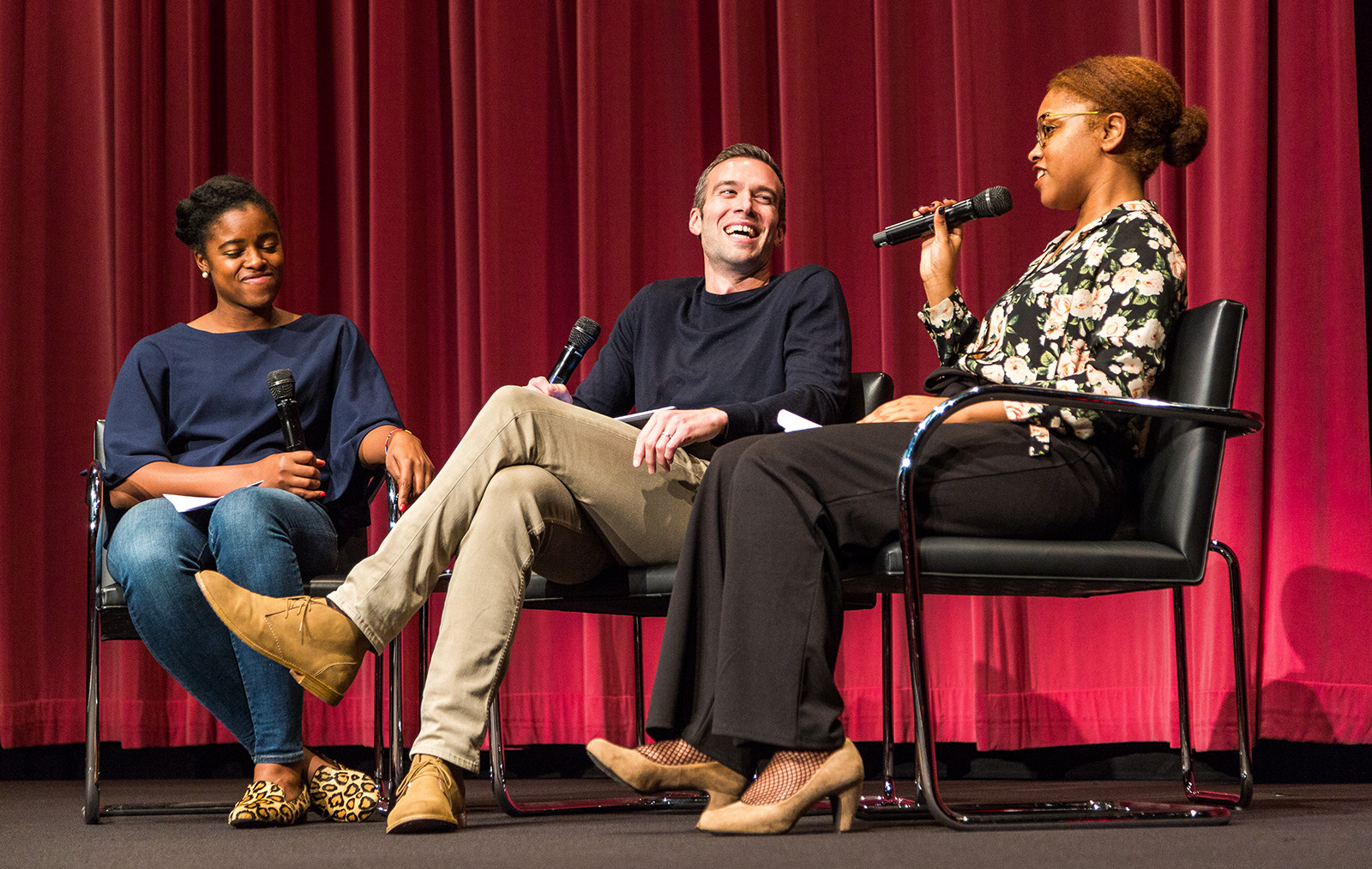Panel discusses political momentum going into 2020 presidential election

Shaniqua McClendon, political director of Crooked Media, Jon Favreau, co-host of the podcast “Pod Save America,” and Kindest Mallet, politics editor at Blavity, analyzed the results of the 2018 midterm election. (Kristie-Valerie Hoang/Daily Bruin senior staff)
By Kristie-Valerie Hoang
Jan. 19, 2019 6:07 p.m.
This post was updated Jan. 26 at 7:19 a.m.
Political commentators said they think the results of the 2018 midterm elections may indicate a Democratic victory in the 2020 presidential election at an event Thursday night.
The event, which took place at the Hammer Museum, featured Jon Favreau, co-host of the podcast “Pod Save America,” and Kandist Mallet, politics editor at Blavity, a multicultural media outlet. They analyzed how the Democrats took control of the House of Representatives, how the demographics of the House have shifted and how the midterm election results may influence the upcoming presidential election.
Shaniqua McClendon, the political director of progressive media company Crooked Media, moderated the forum and opened the event with a summary of the midterm election’s major wins and losses.
According to McClendon’s presentation, California voters flipped four House seats in Orange County, Democrats gained control of five state legislatures and 116 million people cast ballots.
McClendon also mentioned Democratic losses. Several Democratic hopefuls who drew national attention did not win their respective races, such as Stacey Abrams, Georgia Democratic gubernatorial nominee; Andrew Gillum, Florida Democratic gubernatorial nominee; and Beto O’Rourke, Texas Democratic Senate candidate.
Favreau and Mallet analyzed factors that contributed to the election results.
Favreau said the Democratic Party was able to flip seats in California because many increasingly progressive districts no longer aligned with their conservative representatives.
For example, many districts with Republican congressional representatives did not vote for President Donald Trump in the 2016 election. However, those representatives proceeded to side with Trump when voting on legislation regarding immigration or health care, which Favreau said further alienated voters in their districts.
“(Conservative representatives) were very out of step with districts that were heavily populated by college-educated white voters and districts that were becoming very diverse,” Favreau said. “They were hanging on for awhile, but the wave just swept them away.”
Mallet agreed gentrification is changing voter landscapes, particularly in California as many are forced to move out of big cities into surrounding districts. However, she said she thinks other factors, like propositions on the ballot, motivated people to vote rather than the candidates themselves.
Beyond Democratic victories, the 2018 midterm elections saw the highest voter turnout of any midterm election since 1914. Both Mallet and Favreau said controversial decisions made by the Trump administration encouraged people to turn out to the polls.
“Trump triggered an equal and opposite reaction on the opposite side,” Favreau said. “Trump represents a national emergency and the country reacts as if there were a national emergency.”
Mallet said she believes that people also felt more motivated to vote because there were more candidates who came from backgrounds typically underrepresented in politics, such as women and minorities.
“I think that there were a lot of exciting candidates, and even if they weren’t going to be your representative you still got excited for the midterms,” Mallet said.
Democrats should avoid giving too much attention to Trump’s controversial claims heading into the 2020 presidential election, Favreau said.
“Sometimes you do have to hit back and you can’t have Donald Trump running saying racist (things) and not respond, but the problem is, by doing that, he sucks you into his media ecosystem and it’s all about Trump and his racism and his nativism and his sexism,” Favreau said.
The 116th congressional class includes the most women and racially diverse representatives in history. Although Democrats won many seats in the 2018 election, Favreau said he believes the 2020 Democratic presidential nominee is critical in keeping voter momentum moving.
“When we think about who we’re going to nominate in 2020, we need to think about a candidate that inspires that cohort of people and that’s ultimately more important than their resume,” Favreau said.
Favreau added he believes that winning Democratic margins during the 2018 midterm elections could foreshadow a Democratic presidential victory.
“Young people will represent a greater share of the electorate than baby boomers in the 2020 (elections). And even among older voters in 2018, Republicans only broke even,” Favreau said. “If (Republicans) are going to break even among older voters, and then Democrats are winning crushing margins with everyone from 18 to 44, that’s a huge problem for the Republican party.”
Despite the results of the last presidential election, Favreau said Democrats should feel optimistic moving forward because the 2018 midterm results have given them significant momentum for the 2020 election.


